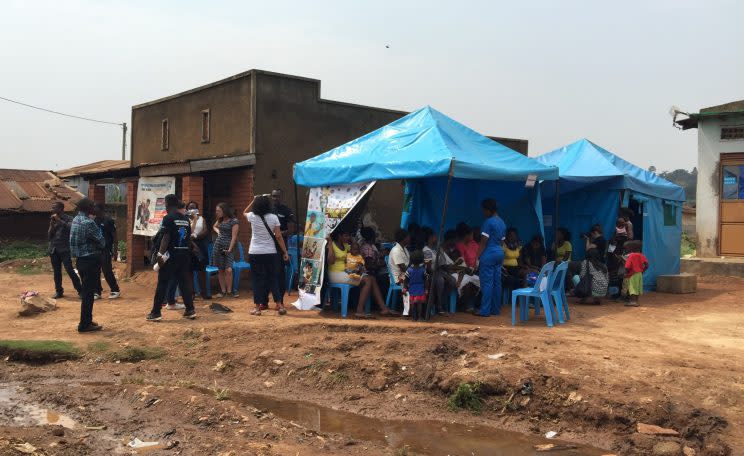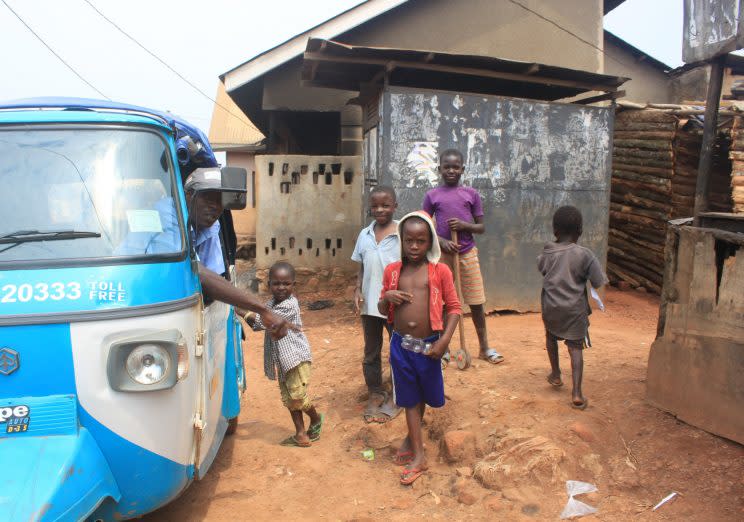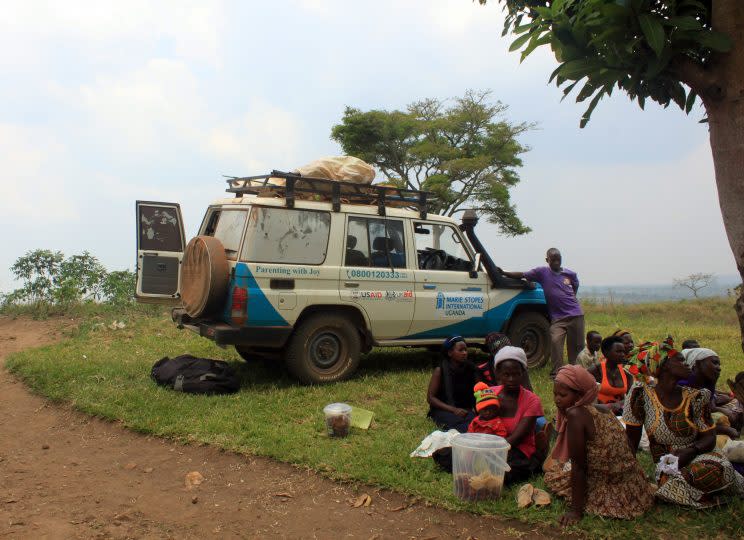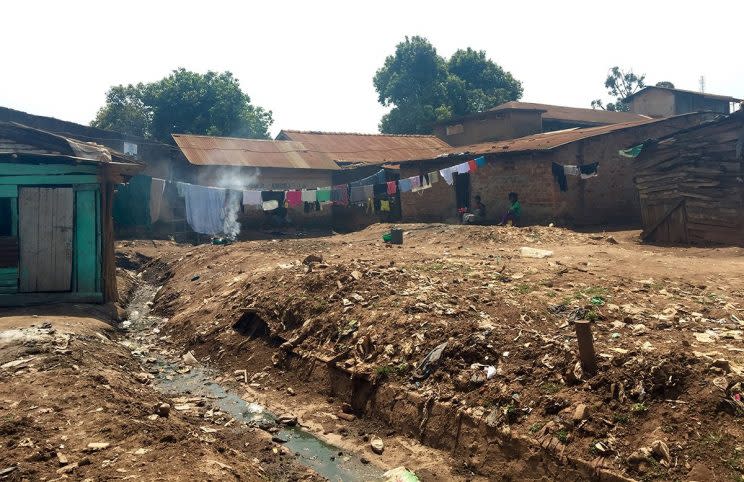How global gag rule could have devastating effects for world’s most vulnerable women

About 4 miles north of Uganda’s capital of Kampala lies the 8-acre slum known as Kimombasa, where thousands of families live without running water or proper sanitation in one-room shacks made of rusty tin. Drugs and crime run rampant, and homes sometimes double as brothels. Living conditions are grim, girls marry early and life expectancy is significantly lower than the national average of 58 years old.
Health care access, though, while still rudimentary, has been a bright spot in the community during the past several years, as access to free family planning services has increased. Nongovernmental family planning organizations such as Marie Stopes International (MSI) have been able to offer reproductive health care to people in places like Kimombasa and other at-risk communities in the developing world. By regularly setting up makeshift clinics under blue plastic tarps, and even sometimes using three-wheeled vehicles known as tuk-tuks to reach places inaccessible by roads, MSI health care workers provide free gynecological screenings, HIV and STI testing, maternal health care, vasectomy procedures for men, contraception and abortions to some of the world’s most vulnerable people. Kimombasa is one of the thousands of communities — both urban and rural — that NGO health services like MSI are able to reach. Often, it is the only health care that is accessible to people in such communities.
But MSI’s ability to provide health care in Kimombasa and throughout the world has been threatened now that President Trump, in one of his first moves as chief executive, reinstated the U.S.’s global gag rule, which bars foreign aid to any NGO that offers abortion services, or even discusses abortion options, to its patients, ever. The rule is also known as the Mexico City Policy, named after the host city of the U.N. International Conference on Population where the U.S. announced it in 1984.

The U.S. does not fund abortion services overseas, even in countries that legally offer abortion in cases of incest, rape or life-threatening complications for the mother. “The money used for any abortion service is very, very separate from USAID funds,” said Maaike van Min, strategy and development director with MSI. But under the Mexico City rule, American aid would be denied to organizations like MSI if it also provided abortions through separate funding sources.
President Ronald Reagan enacted the policy in 1984, and it has gone in and out of effect since, depending on which party holds the Oval Office. Bill Clinton immediately rescinded the policy in his first week as president. George W. Bush reinstated it, and Barack Obama nixed it again. Trump’s move to reenact the policy falls in line with his campaign promise to restrict abortion rights, both domestic and abroad.
“The world’s most vulnerable women will suffer as a direct result of this policy, which undermines years of effort to improve women’s health,” tweeted Cecile Richards, president of Planned Parenthood, following the news.
The world’s most vulnerable women will suffer as a direct result of this policy, which undermines years of effort to improve women’s health.
— Cecile Richards (@CecileRichards) January 23, 2017
Antiabortion groups and Republican leaders praised the move.
Family Research Count President Tony Perkins said in a statement, “This is a vital step in the journey to make America great again, recognizing and affirming the universal ideal that all human beings have inherent worth and dignity, regardless of their age or nationality.”
Van Min said she wasn’t surprised by Trump’s executive action, but because USAID accounts for 17 percent of Marie Stope’s funding ($30 million last year), the organization is now “working very hard to fund that gap, but it’s going to be a significant challenge to ensure care for all the patients we’re currently serving around the world.” She was also quick to note that the “vast majority” of MSI services are not related to abortion or even the discussion of abortion.
Currently, 20.9 million men and women around the world use contraception provided by MSI, which estimates it has prevented 6.3 million unintended pregnancies and 4 million unsafe abortions. Its work also has thwarted an estimated 12,600 maternal deaths. Even with the work of such NGOs, more than 225 million women globally do not have access to family planning services.

MSI projects that with the loss of USAID for its contraception and family planning services, there will be as many as 2.1 million additional abortions in the areas it serves during the next three years.
In a statement from the U.N. Foundation, an organization that connects the goals of the U.N. with NGOs around the world on issues on female empowerment, UNF CEO Kathy Calvin said: “This action will do more than change policy; it will make it more difficult for millions of girls and women to access the contraception and health care they need to determine their futures.”
When the policy was last enacted, during the George W. Bush administration, health care clinics in many countries were forced to close, and outreach services for the most vulnerable populations were eliminated, Calvin said. Millions of people around the globe were left without critical health services, including maternal and child health care, HIV testing and counseling, and contraceptives, including condoms. “Without these life-saving services, more women and infants died due to pregnancy-related complications,” she said.
In fact, banning abortions doesn’t reduce abortion, according to several studies conducted by the World Health Organization. Cutting access to contraception increases pregnancy rates and the incidence of illegal, makeshift and unsafe abortion practices.
But the cut goes far beyond health care access, said van Min. Once basic screenings and contraception and exams aren’t accessible, a domino effect begins for women, and in turn, communities.

“When half of the people in a population aren’t able to fulfill their potential because they don’t have control of their fertility and they don’t have the ability to protect themselves from pregnancies or STIs, that means they’re less likely to finish their education, have a career, control the number of children they can have and raise into strong adults,” said van Min.
That has debilitating and costly effects on a country as a whole.
“Basic health care is the base of everything else in our lives, and in our Western societies, we are lucky to be able to take it for granted,” said van Min. “It’s not even something most people think about in their day, but I think if men and women step back and think about where they’d be without any sort of access to family planning, they’d find it striking.”
When discussing and thinking about broad policy issues, it’s difficult to appreciate how many people are actually affected, said van Min. “Those women in Kampala could just as easily be you or me.”


